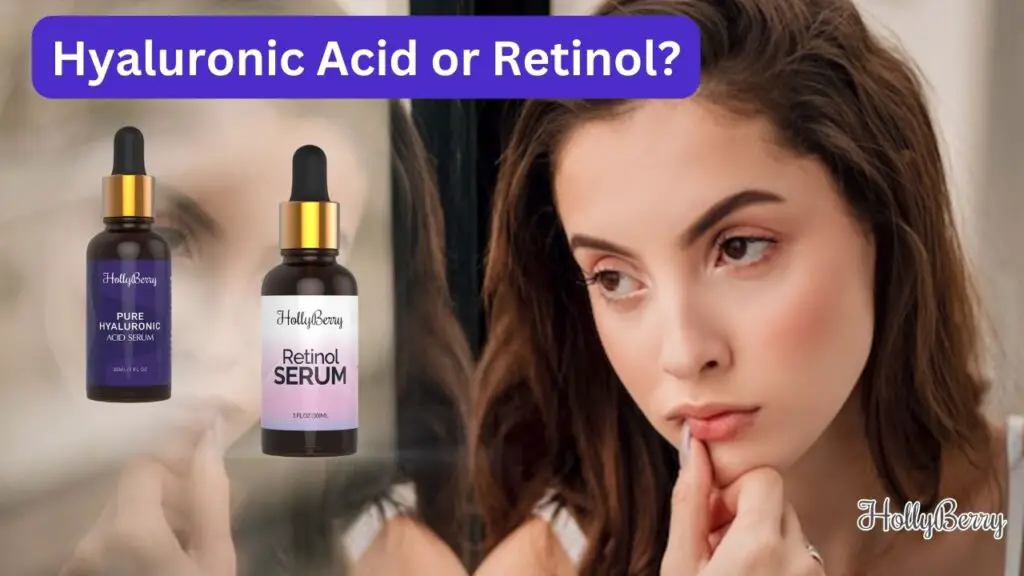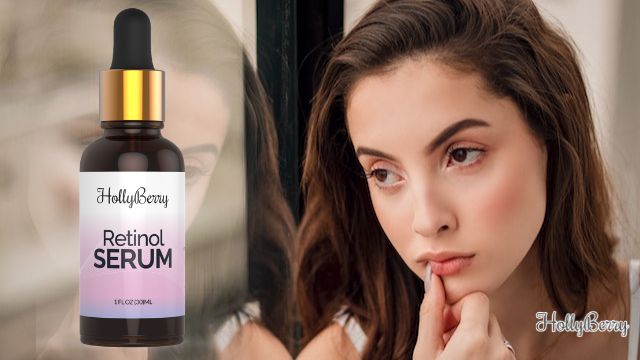
Skincare is an important aspect of many people’s lives, and with so many products and ingredients on the market, it can be difficult to know what to choose.
Two popular ingredients that are often discussed in the skincare world are retinol serum and hyaluronic acid. In this article we’ll dive into the benefits of each ingredient, who should use them, and whether one is better than the other.
What are the benefits of using retinol serum?

Retinol serum is a popular skincare product that is derived from vitamin A. It is well-known for its ability to help reduce the appearance of fine lines, wrinkles, and other signs of ageing. Here are some of the key benefits of using retinol serum:
Smooths out fine lines and wrinkles: Retinol is a powerful anti-ageing ingredient that helps to stimulate the production of collagen and elastin, which are essential for maintaining firm, youthful-looking skin.
Regular use of retinol serum can help to smooth out fine lines and wrinkles, making your skin look more radiant and youthful.
Improves skin texture and tone: In addition to reducing the appearance of fine lines and wrinkles, retinol can also help to improve the overall texture and tone of your skin. It can help to reduce the appearance of hyperpigmentation, acne scars, and other skin imperfections, giving your skin a smoother, more even look.
Boosts cell turnover: Retinol is a powerful exfoliant that can help to boost cell turnover in the skin. This means that it can help to slough off dead skin cells and promote the growth of new, healthy skin cells. This can help to unclog pores, reduce the appearance of acne, and give your skin a brighter, more radiant look.
Increases skin hydration: Despite being an exfoliant, retinol serum can actually help to increase skin hydration. It can help to strengthen the skin barrier and lock in moisture, leaving your skin feeling soft and supple.
Fights acne: Retinol can also be effective in treating acne. It works by unclogging pores and reducing inflammation, which is two of the main causes of acne. Regular use of retinol serum can help to reduce the frequency and severity of breakouts, leaving your skin looking clearer and more radiant.
It’s important to note that retinol can be a powerful ingredient, and some people may experience side effects like dryness, redness, or peeling when they first start using it. It’s best to start with a low concentration of retinol and gradually increase it over time to avoid irritation.
Additionally, retinol can make your skin more sensitive to the sun, so it’s important to wear sunscreen when using retinol products. Overall, however, retinol serum can be an effective addition to your skincare routine, helping to reduce the signs of ageing, improve skin texture and tone, and fight acne.
What are the benefits of using hyaluronic acid?

Hyaluronic acid is a popular skincare ingredient that is known for its ability to hydrate and plump the skin. Here are some of the key benefits of using hyaluronic acid in your skincare routine:
Provides intense hydration: One well-known benefit of hyaluronic acid is it provides deep hydration to the skin. This is because hyaluronic acid is a humectant, which means that it can attract and hold onto water molecules.
By adding hyaluronic acid to your skincare routine, you can help to ensure that your skin stays hydrated, plump, and healthy-looking.
Helps to reduce the appearance of fine lines and wrinkles: Hyaluronic acid can help to reduce the appearance of fine lines and wrinkles. When the skin is well-hydrated, it looks smoother and more supple, which helps to make fine lines and wrinkles less noticeable.
Some research finds that hyaluronic acid will help to stimulate collagen production, which can further improve the appearance of the skin.
Improves skin texture and tone: HA provides hydration and reduces fine lines, hyaluronic acid also helps to improve the overall texture and tone of the skin. By plumping skin and maintaining hydration, hyaluronic acid can help to reduce the appearance of dullness and uneven texture.
Can be used on all skin types: One of the great things about hyaluronic acid is that it can be used on all skin types, including oily, dry, and sensitive skin. This is because it is a gentle ingredient that is unlikely to cause irritation or other negative side effects.
Boosts the effectiveness of other skincare products: Finally, using hyaluronic acid in your skincare routine can help to boost the effectiveness of other products that you use. This is because hydrated skin is better able to absorb and utilize other ingredients, which can help to maximize the benefits of your skincare routine overall.
Overall, hyaluronic acid can be an excellent addition to your skincare routine if you’re looking to improve hydration, reduce the appearance of fine lines and wrinkles, and improve the overall texture and tone of your skin.
Whether you have dry, oily, or sensitive skin, hyaluronic acid can help to keep your skin looking healthy, plump, and radiant.
Who should use retinol serum, and who should use hyaluronic acid?
Retinol serum
Retinol serum is best suited for those who are concerned with anti-ageing. This includes individuals who are looking to reduce the appearance of fine lines, wrinkles, and other signs of ageing, as well as those who want to improve overall skin texture and tone.
Retinol can also be effective in treating acne, as it works by unclogging pores and reducing inflammation. However, it’s important to note that retinol can be a powerful ingredient, and some people may experience side effects like dryness, redness, or peeling when they first start using it.
If you have sensitive skin or are prone to irritation, it’s best to start with a low concentration of retinol and gradually increase it over time.
Hyaluronic acid
Hyaluronic acid, on the other hand, is best suited for those who are looking to improve skin hydration and overall skin health. This includes individuals who have dry or dehydrated skin, as well as those who want to reduce the appearance of fine lines and wrinkles.
Hyaluronic acid can also be helpful for those with sensitive skin, as it is a gentle ingredient that is unlikely to cause irritation or other negative side effects.
Additionally, because hyaluronic acid can be used in conjunction with other skincare ingredients, it can be a great choice for those who want to maximize the benefits of their entire skincare routine.
It’s worth noting that both retinol serum and hyaluronic acid can be used by a wide range of individuals, regardless of age or skin type.
However, it’s important to choose the right product and concentration for your unique skin concerns and needs. If you’re unsure which ingredient to choose, consider speaking with a dermatologist or skincare professional who can help guide you in the right direction. Order our hyaluronic acid at our store here.
My final thoughts: which is better, retinol serum or hyaluronic acid?
Asking whether retinol serum or hyaluronic acid is better is a common question, but the truth is that both ingredients have different benefits for the skin. So, the answer really depends on what you’re looking to achieve with your skincare routine.
If you’re primarily concerned with reducing the appearance of fine lines, wrinkles, and other signs of ageing, then retinol serum may be the better choice for you.
Retinol is a powerful anti-ageing ingredient that can help to stimulate the production of collagen and elastin, which are essential for maintaining firm, youthful-looking skin.
Additionally, retinol can help to improve overall skin texture and tone, as well as reduce the frequency and severity of breakouts.
On the other hand, if your main concern is hydration and overall skin health, then hyaluronic acid may be the better choice for you. Hyaluronic acid is a humectant that can attract and retain moisture in the skin, which helps to keep the skin hydrated, plump, and healthy-looking. It can also help to reduce the appearance of fine lines and wrinkles and improve overall skin texture.
It’s worth noting that both retinol serum and hyaluronic acid can be used together in a skincare routine, as they complement each other well. However, it’s important to introduce these ingredients slowly and carefully, as they can be powerful and may cause irritation if used in excess. It’s also important to choose products with the right concentrations of each ingredient for your unique skin concerns and needs.
Ultimately, the decision between retinol serum and hyaluronic acid comes down to your personal skincare goals and concerns. Whether you choose one or both, incorporating these ingredients into your routine can help to improve the overall health and appearance of your skin.


